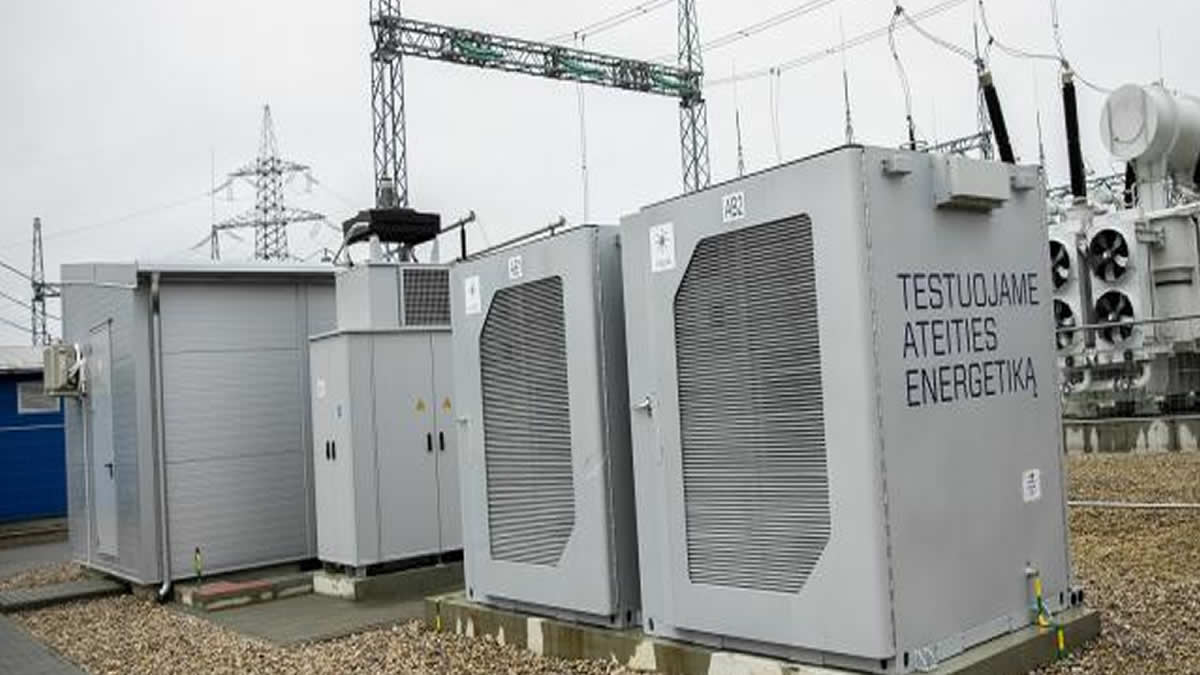Litgrid, the Lithuanian power transmission system operator, has completed the testing of the first 1 MW battery system in the Baltic states connected to the power transmission grid. The data collected during the tests are important in preparing the Lithuanian electricity system for synchronisation with the Continental European Synchronous Area, ensuring the reliability of the system and the further development of rapidly growing renewable energy generation in the country.
“In the next few years, we will see the transformation of the electricity sector and the breakthrough of renewable energy in Lithuania: we will synchronise with the Continental European Synchronous Area, and the projects of offshore wind power plants will be developed. It is planned that by 2030 about half of the electricity consumed in Lithuania will be produced from renewable energy sources. This means our generation will be largely climate-neutral, but it will also challenge us as a transmission system operator, as ensuring high levels of reliability in the management of a system dominated by renewables and battery-based energy storage is a new and ambitious goal. However, we are consistently preparing for it,” says Rokas Masiulis, CEO of Litgrid.
The 1 MW battery with 1MWh capacity has been supplied by Fluence, a leading provider of energy storage products, services, and digital applications, and installed at the Vilnius Transformer Substation (TS). The project is the first of its kind in the Baltic Region, and one of the first energy storage as ‘virtual transmission lines’ (VTL) deployments in Europe.
“Battery-based energy storage as a VTL provides vast benefits for grid operators, including increased resilience and stability enabling greater deployment of renewable energy. The successful completion of the 1MW pilot project marks a substantial step towards rolling out battery-based energy storage at the transmission network level in Lithuania and across Europe,” said Paul McCusker, President for EMEA at Fluence.
“We are proud to work with a forward-thinking TSO like Litgrid, bringing innovation to the way transmission networks operate and pioneering new technologies that deliver safe and reliable energy storage systems to support Lithuania’s energy transition.”
Litgrid specialists have been testing the capability of this device to operate in the transmission grid for four months since autumn last year. The battery storage system was tested according to a test programme developed by Fluence and Litgrid. During the tests, the battery was connected to the 10 kV Vilnius substation.
Litgrid specialists tested the battery’s ability to perform more than ten different functions of the transmission network management under the actual operating conditions of the Lithuanian power system. The tests included on-site and remote control of the battery’s power, its efficiency, emergency power function, frequency control functions, synthetic inertia response, voltage control function, isolated operation for the self-supply of power to the Vilnius TPP, and many more.
“All the planned tests were successful. As expected, the 1 MW battery can contribute to the control of power system parameters. The most surprising thing was the lightning-fast response of the battery, with a control command processing time of 0.087 seconds and a complete switch from charging to generation in even less time – 0.07 seconds. This is broadly in line with the trigger times for relay protection. Such parameters give us optimism that the management of the power system will be smoother in the future,” says Audrius Baranauskas, Head of Innovation Department of Litgrid’s Strategy Department.
The 1 MW battery and its infrastructure will continue to operate as an integral part in the power transmission system, contributing to the voltage management of the Vilnius TP 10 kV switchyard and ensuring emergency reserve availability. It will also continue to be used for research and other innovative projects.
The 1 MW battery pilot project has produced technical specifications for batteries, which led to developing requirements for a 200 MW portfolio of battery-based storage systems. It is expected that the valuable experience and knowledge gained from the pilot project will contribute to the smooth implementation of the 200 MW project.
The 200 MW energy storage system project is being implemented by Energy Cells, a company within the “EPSO-G” group of companies. The project will see the installation of four 50 MW energy storage systems provided by Fluence at four sites in Lithuania by the end of 2022. The system, installed at substations in Vilnius, Alytus, Utena and Šiauliai, will serve as a fast and flexible emergency power reserve to ensure reliable and stable operation of Lithuania’s power system until synchronisation with the continental European grid or during isolated operation of the power system, and in the future, will support the integration of the rapidly growing renewable energy sources.
Source: www.litgrid.eu
 En
En